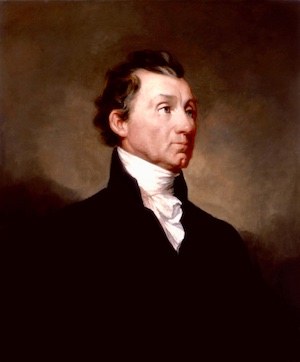
James Monroe (c. 1819) by Samuel Morse (1791-1872)
Whatever his failings as an imaginative thinker, President James Monroe’s own convictions were rooted deeply in the spirit and the letter of the U.S. Constitution. As he entered the White House in March 1817, he had little (well, less) use for James Madison’s newfound love of nationalism. While he entered the presidency too late to stop the Second Bank of the United States from forming, he could and did make sure that the government’s role in creating public works was limited. If the people truly wanted the government building more canals and roads, he thought, they would need to get an amendment to the Constitution passed, as the Constitution of 1787 did not allow for such things, he believed. And, though a Virginian and in sympathy with many of the Old Republican beliefs of John Randolph of Roanoke and John Taylor of Caroline, he was not one of them, and he feared the creation of any parties or factions.
Echoing his hero, George Washington, Monroe asserted vehemently that “the existence of parties is not necessary to free government.” Indeed, he actively discouraged them. He wanted unity, and he believed the American republic – especially in 1817 – necessitated it.
Equally gratifying is it to witness the increased harmony of opinion which pervades our Union. Discord does not belong to our system. Union is recommended as well by the free and benign principles of our Government, extending its blessings to every individual, as by the other eminent advantages attending it. The American people have encountered together great dangers and sustained severe trials with success. They constitute one great family with a common interest. Experience has enlightened us on some questions of essential importance to the country. The progress has been slow, dictated by a just reflection and a faithful regard to every interest connected with it. To promote this harmony in accord with the principles of our republican Government and in a manner to give them the most complete effect, and to advance in all other respects the best interests of our Union, will be the object of my constant and zealous exertions.
Monroe’s own experience in government was quite extensive and utterly impressive. He had studied law with Thomas Jefferson after attending (for a short time) William and Mary. In addition to serving nobly in the War for Independence (he was the last of the U.S. Presidents to have served in the war as an adult), Monroe also served in the Virginia Assembly, as governor of Virginia, as a member of the Continental Congress, as a U.S. Senator, and as a minister to London, Paris, and Madrid. During Madison’s presidency, he served as both Secretary of War and Secretary of State. He was a man deeply committed to the creation and preservation of the American Republic. He exuded so much republican virtue that Jefferson once said of him, as historian George Dangerfield recorded, that “he is a man whose soul might be turned wrong side outwards without discovering a blemish to the world.”
Despising political parties and factions, President Monroe attempted to create a cabinet that reflected the various sections of the country. In this, he failed, getting New Englander John Q. Adams to serve as Secretary of State, but then appointing two Southerners – William Crawford and John C. Calhoun – to become Secretary of the Treasury and Secretary of War, respectively. No one – to Monroe’s distress – represented the American frontier.
Though the country enjoyed a few years of patriotic revival after the glorious success of Andrew Jackson’s militia at the Battle of New Orleans, 1819 undid almost all successes, with Missouri applying for admission as a slave state and the United States experiencing its first economic depression.
To be certain, Monroe reveled in the position that America held in the Western Hemisphere, and, by extension, throughout and in the world.
Fortunate as we are in our political institutions, we have not been less so in other circumstances on which our prosperity and happiness essentially depend. Situated within the temperate zone, and extending through many degrees of latitude along the Atlantic, the United States enjoy all the varieties of climate, and every production incident to that portion of the globe. Penetrating internally to the Great Lakes and beyond the sources of the great rivers which communicate through our whole interior, no country was ever happier with respect to its domain. Blessed, too, with a fertile soil, our produce has always been very abundant, leaving, even in years the least favorable, a surplus for the wants of our fellow-men in other countries. Such is our peculiar felicity that there is not a part of our Union that is not particularly interested in preserving it. The great agricultural interest of the nation prospers under its protection. Local interests are not less fostered by it. Our fellow-citizens of the North engaged in navigation find great encouragement in being made the favored carriers of the vast productions of the other portions of the United States, while the inhabitants of these are amply recompensed, in their turn, by the nursery for seamen and naval force thus formed and reared up for the support of our common rights. Our manufactures find a generous encouragement by the policy which patronizes domestic industry, and the surplus of our produce a steady and profitable market by local wants in less-favored parts at home.
Two disasters befell Monroe’s America in 1819, as noted above. America weathered both events, but it did so beaten and bruised, with wounds festering for and over the next five decades. Yet, America, perhaps miraculously, held together. In large part, it held together because of two persons, both of whom made Monroe better than he was: John Quincy Adams as the finest Secretary of State in American history, and Andrew Jackson as the finest militia leader in American history. But, Quincy Adams and Jackson should be the subject of another essay – quite independent from this one.
Needless to write, by the end of James Monroe’s two terms, the United States had avoided another war with Great Britain by accepting joint custody of the Oregon (Oregon, Washington, and British Columbia) country, had created the longest and freest border in the world (the U.S. Canadian border), had demilitarized the Great Lakes, had secured fishing rights in the North Atlantic, and had acquired Florida from the corrupt Spanish empire.
Not shabby for a brand new republic that still feared political parties.
Written by Bradley J. Birzer for The Imaginative Conservative – April 27, 2023

 FAIR USE NOTICE:
FAIR USE NOTICE: